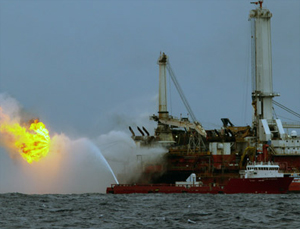CBC’s Blowout doc scares to educate

It worked for Al Gore – a doomsday scenario for global warming portrayed in his Oscar-winning documentary An Inconvenient Truth.
To educate and scare people.
Indie producer Up Front Entertainment has gone for the same worst-case scenario approach to filmmaking in Blowout: Is Canada Next?, a documentary that warns against a possible volcanic explosion at a deepwater oil well off of Newfoundland that could devastate that province’s offshore fishing industry and sea bird populations.
“You definitely want to bring it home to people to make them care,” explained Blowout producer/writer/director Nadine Pequeneza.
The CBC documentary, to air this Thursday night, recounts British Petroleum’s giant Deepwater Horizon drilling platform blowout on April 20 in the Gulf of Mexico, and its catastrophic impact on the region’s fishing and tourism industries over the three months it took to plug the well.
Pequeneza’s documentary then uses a combination of interviews with scientists and speculation to dramatize a prophesied oil rig blowout in any of Newfoundland’s oil fields that potentially could decimate the province’s Atlantic cod industry.
The indie filmmaker originally pitched the CBC on an oil spill documentary a month after the Deepwater Horizon drilling platform exploded in the Gulf of Mexico.
The initial plan was to follow the science of what was being discovered in the wake of the disaster.
But ongoing discussion with Michael Claydon, the CBC commissioning editor, led to a decision to also investigate the impact of a big oil spill off the coast of Newfoundland.
Pequeneza said deliberately comparing and contrasting a real U.S. oil spill and a possible Newfoundland oil blowout again helped the documentary sell Canadians on a peril.
“That’s (the Gulf disaster) so present in people’s minds, that comparing it makes it real for them, and understandable,” she explained.
The what-if scenario presented in Blowout includes questioning safety procedures and clean-up techniques that might be employed to contain a giant oil spill off the coast of Newfoundland.
The answers are hardly reassuring.
“What I found most scary in making this film is it was very difficult to actually get a picture of what the impact would be of an oil spill of that magnitude off the east coast,” Pequeneza reported.
“Even though every scientist said it would be bad, they couldn’t say how bad. And there’s very little research that’s been done,” she added.
The implication drawn by Blowout is that the frigid and roiling Atlantic ocean would greatly complicate efforts by Canadians to contain their own off-shore oil disaster, compared to the recent BP-led clean-up in the warmer waters of the Gulf of Mexico.
The need to educate/scare Canadians in Blowout also springs from the reality of most off-shore oil spills: its impact is mostly invisible, buried deep below the ocean’s dark surface, especially if toxic chemicals are used to disburse thick oil into tiny droplets.
“The ocean is so complex, that trying to get specific answers to specific types of questions [is difficult]: how will it affect fish stocks, birds or whales; or where will the oil go,” Pequeneza insisted.
“Even month by month, the ocean waves and winds change, and everything is interconnected, so it’s very hard to give definite answers,” she added.
Blowout: Is Canada Next? will air Thursday, December 9 at 9 p.m. on the CBC.

 The definitive CDN broadcast and production resource.
The definitive CDN broadcast and production resource.










